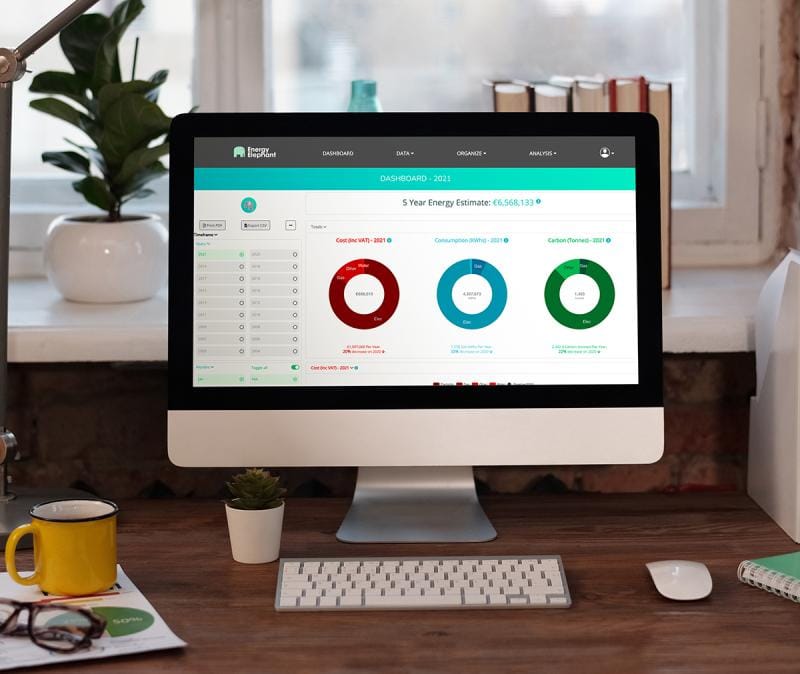Unlock Real-time Energy & Carbon Data to Boost Your GRESB Rating
A high GRESB Rating holds significant weight, shaping investor decisions and driving ESG strategies. Using an energy management system and sustainability software, with access to real-time data at an asset level, can help you both meet compliance and improve your GRESB Performance Score.

In the world of real estate, a high GRESB Rating holds significant weight, shaping investor decisions and driving Environmental, Social, and Governance (ESG) strategies. We show you how harnessing the power of an energy management system and sustainability software, with access to real-time data at an asset level, can help you both meet compliance and improve your GRESB Performance Score.
What is GRESB?
GRESB (Global Real Estate Sustainability Benchmark) is an internationally recognised sustainability assessment organisation that provides standardised, validated ESG performance data and peer benchmarks to financial markets, with the purpose of improving business intelligence, industry engagement, and decision-making.
As a profit-for-purpose company and Certified B Corp, it is transforming the way the real estate and infrastructure sectors evaluate, compare, and improve the ESG performance of their investments. GRESB data is currently used by more than 150 institutional and financial investors across the world to monitor their investments.

Why is GRESB participation important to investors & asset managers?
Participation in GRESB assessments aids investors and asset managers in risk assessment and portfolio enhancement.
A high GRESB Rating demonstrates a real estate entity's ability to effectively manage ESG risks, and indicates a commitment to the incorporation of sustainable practices into its operations. This increases demand for these properties, which in turn enhances their marketability, making them more attractive to investors seeking sustainable investments.
In 2022, GRESB found that over 75% of surveyed investors encourage their managers to participate in assessments, with almost a third of investors making participation mandatory.
What does a GRESB Assessment involve?
The GRESB Real Estate Assessment comprises three components, and offers two benchmark reports, depending on an entity's participation and needs.
A. The Management component includes information on an entity's strategy and leadership, policies and processes, risk management, and stakeholder engagement at the organisational level.
B. The Performance component includes information on an entity's energy consumption, greenhouse gas (GHG) emissions, water use, and waste management at an asset level, as well as tenant and community engagement.
C. The Development component includes information on an entity’s efforts to address ESG issues during a building’s design, construction, and renovation phases.
Depending on the components completed, two separate reports can be generated:
- The GRESB Standing Investments Benchmark Report is available to participants who complete the Management and Performance components (A+B) of the assessment.
- The GRESB Development Benchmark Report is available to participants who complete the Management and Development components (A+C) of the assessment.
Deadline Alert
1 July 2024
If you miss the July 1st submission deadline for 2024 GRESB Assessments, you’ll have to wait till the next assessment cycle, which opens in April 2025.
How can sustainability software help you ace your GRESB Assessment?
The calculation of your GRESB Rating is based on your GRESB Score. And data coverage of your energy consumption, GHG emissions, water use, and waste management at an asset level directly impacts a number of points in the Performance component of your assessment.
For managers operating large and/or geographically diverse portfolios, with utility bills that account for multiple tenants, collating all this data can be a Herculean task. But harnessing the power of a data analytics platform that automates your energy, waste, water and carbon reporting and management can significantly simplify and streamline the process.

Automated data analytics saves time, simplifies compliance
EnergyElephant is a cloud-based sustainability software solution, designed specifically for energy and carbon monitoring and reporting. It uses intelligent automation to eliminate painfully manual tasks, reducing your energy and carbon data management time by more than 90%.
The system provides a single access point for audits to substantiate data. Besides GRESB, it also supports the CDP, CSRD, Energy Star, ERIC, Greenhouse Gas Protocol, ISO 14001, ISO 50001, SBTi, SECR, B Corp, and other international reporting frameworks.
Energy efficiency reduces costs, improves sustainability
EnergyElephant can integrate with smart meters and sub-meters across your facilities in different countries/regions. With live monitoring and access to real-time data at asset level, the system helps identify areas that need attention on any given site. Being able to take corrective action within minutes of an incident occurring leads to improved energy efficiency, reduced resource consumption, and lower operating costs – all of which directly impact your GRESB Performance Score.
In a recent webinar aimed at property owners and managers striving to meet ambitious Net Zero targets and establish sustainable portfolios, Ruben Langbroek, Head of Asia Pacific at GRESB, said: “We've seen that by rewarding data coverage of portfolios in terms of operational performance metrics, energy consumption, greenhouse gas emissions across different scopes, water waste – that indeed the building owners and landlords assessing have been able to improve the performance of their assets just by understanding what's happening, both within the base building as well as in tenant spaces.”

In a recent GRESB Insights article, author Jesse Anderson, who serves on the Sustainability Advisory Board at the Institute of Real Estate Management (IREM), highlights the role of property managers in carrying out owners’ ESG goals.
He emphasises the need for alignment with owners’ objectives, educational initiatives, baseline assessments, and continuous monitoring. And he encourages property managers to leverage validated ESG data from GRESB participation to market their successes, which can help attract customers, employees, and business partners.
If you can measure it, you can manage it. And if you can manage it, you can improve it. EnergyElephant offers a free 14-day trial and/or a three-month Proof of Value (PoV), so you can make sure the system meets your requirements before making any significant financial commitment.
